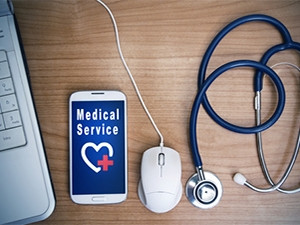
Local scientists have developed a technological innovation, underpinned by cloud computing, which will assist in testing for HIV drug resistance in SA.
Professor Simon Travers and his team of researchers based at the South African National Bioinformatics Institute (SANBI) at the University of the Western Cape (UWC) have launched the Exatype platform, which runs on Amazon Web Services (AWS).
Exatype will improve clinicians' ability to diagnose HIV drug resistance in patients and provide them with a correct course of treatment, by analysing data from multiple patients securely and simultaneously.
"The main reason we're using AWS is because it enables us to have unlimited scaling and be able to analyse thousands of samples at the same time without any delay in getting results back to the clinician," Travers told ITWeb.
He says using cloud-based technologies is also cost-efficient because there is no need for substantial capital investment to be able to roll out computational-intensive technologies.
"We only pay for the computing resources as and when we need them, meaning we can substantially reduce the costs of processing all of this data. Without scalable cloud-based infrastructure, it would be impossible to develop technologies such as these."
How Exatype works
A blood sample is taken from a patient by their doctor or nurse and is sent to a centralised pathology lab. The lab extracts the virus and obtains the DNA sequence of the virus using sequencing machines. The output is then uploaded to the Exatype Web site to be analysed and a report is sent back to the pathology lab or doctor.
"The long-term hope is that these sequencing machines will become so portable that the clinician will be able to easily produce the sequence data at the point of care and receive a drug resistance report immediately," says Travers.
He says this is the first time an analysis platform has been developed that is capable of analysing the data directly from the sequencing machine.
"One other tool is available but requires end-users to do some analysis on the data prior to uploading. It is substantially more expensive and has a much lower accuracy rate than Exatype."
Growing prevalence
Statistics SA's July 2015 report revealed that over six million South Africans, or 11.2% of people in the country, are living with HIV. According to the Department of Health, around 1 000 new infections are reported daily and among those diagnosed, 10% do not respond adequately to the first-line anti-retroviral (ARV) drugs provided to them.
Travers says studies have shown the longer a HIV treatment programme continues without routine drug resistance testing, the higher the prevalence of resistance in HIV-positive patients prior to treatment initiation.
"Currently practically no HIV drug resistance testing is done," according to Travers.
Because of SA's high HIV prevalence, fast diagnosis is essential so that more patients can be put on the correct ARVs more quickly.
"The sheer numbers of people that are infected with HIV (and other diseases) in South Africa means it is essential that technological innovation continues to happen in order to provide us with the tools to fight these diseases."
Expansion plans
Although Exatype is initially focused on HIV drug resistance testing, Travers plans to develop solutions for TB and antibiotic resistance testing.
"We really feel that as a South African company, we are proud to be able to provide these types of diagnostics to people who need them most in resource-limited settings," he says.
There is also huge opportunity to expand the platform across the world.
"Because it is Web-based we can, theoretically, expand globally immediately. We're currently working with various partners to expand out of South Africa," he adds.
The programme was funded by the Department of Science and Technology with support from the Technology Innovation Agency, the South African Medical Research Council's Strategic Health Innovation Partnerships unit and the Amazon Web Services grant programme.
Share